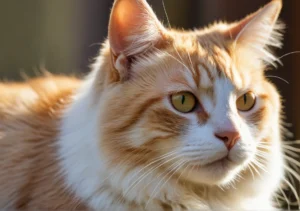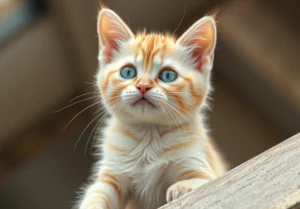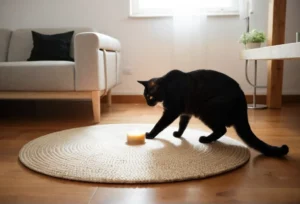Cats have a tendency to hunch down at times, displaying an intriguing behavior that can leave owners curious. Why do these graceful creatures suddenly crouch low to the ground?
When cats hunch down, it is often a sign of alertness and readiness to pounce on prey or play. This behavior is deeply rooted in their instincts and serves a practical purpose in their daily lives. Let’s explore the reasons behind why cats exhibit this fascinating behavior.
Instinctual Behavior: The Roots of the Hunch
When it comes to understanding why cats hunch down, we need to look back at their instinctual behavior. Cats are natural hunters, and their hunching posture is deeply rooted in their predatory nature. Cats have a keen sense of awareness and use their hunched position to camouflage themselves and stay low to the ground while stalking prey.
This instinctual behavior can also be traced back to their survival instincts. Hunching down allows cats to conserve energy and remain alert to potential dangers in their environment. It serves as a way for them to stay ready to pounce at a moment’s notice, demonstrating their agility and quick reflexes.
One interesting insight into cats’ hunching behavior is their ability to adjust the intensity of their posture based on the situation. A cat may hunch down slightly when curious about something or fully lower their body when ready to attack. This flexibility in their posture highlights the intricate nature of their instincts and their adaptability to different scenarios.
If you notice your cat hunching down, it’s essential to observe their surroundings and understand the context in which they are exhibiting this behavior. By recognizing their instinctual roots, you can gain a deeper appreciation for your feline companion and their unique behaviors.
Communication through Posture: What Hunching Means
When it comes to cat communication, body language plays a crucial role in conveying messages to humans and other animals. Hunching down is a subtle yet powerful way for cats to communicate various emotions and intentions.
One common reason cats hunch down is to express a sense of fear or anxiety. This posture allows them to make themselves appear smaller and less threatening, showing their vulnerability in certain situations. It’s essential to acknowledge this signal and provide your cat with comfort and reassurance to help them feel safe.
On the other hand, cats may also hunch down as a sign of playfulness or excitement. This posture often accompanies pouncing and chasing behavior, indicating that they are in a playful mood. Understanding the context in which your cat is hunching down can help you engage with them in a way that meets their needs and enhances your bond.
Next time you see your cat hunching down, take a moment to observe their body language and emotions. By interpreting their hunched posture, you can better understand their feelings and communicate effectively with your feline friend.
Remember, cats have a unique way of expressing themselves through their body language, and hunching down is just one of the many ways they convey their thoughts and emotions. By paying attention to these subtle cues, you can deepen your connection with your cat and create a more harmonious relationship.
Playful Pounce: Hunching in Playtime
When your feline friend gets into a crouch, ready to pounce, it’s often a sign that they’re in playful mode. Cats instinctively lower their bodies close to the ground, hunching down in anticipation of a playful chase or game. This posture allows them to stay low, sneak up on their “prey” (which could be a toy, a feather, or even your hand), and maintain a sense of agility and speed during the interaction. So, if you notice your cat hunching down before they zoom off in excitement, rest assured, it’s all in good fun!
The Hunting Stance: Hunching Before the Pounce
Before your cat goes in for the kill (or in a domestic setting, a playful attack), you may witness them adopting a hunched posture. This behavior is deeply rooted in their hunting instincts. Whether in play or actual hunting scenarios, cats hunch down to lower their center of gravity, preparing to spring forward with precision and speed. It’s a strategic move that allows them to maintain balance, control, and stealth as they stalk their “prey.” So, the next time you see your cat in this focused stance, know that they’re channeling their inner predator, even if it’s just a harmless game of chase.
- Tail Language: Keep an eye on your cat’s tail while they hunch down. A twitching or flicking tail can indicate excitement or concentration, adding an extra layer to their body language cues during play or hunting behavior.
Remember, understanding why cats hunch down gives us valuable insights into their natural behaviors and instincts. It’s all part of what makes these mysterious creatures so fascinating to observe and interact with.
Environmental Factors: Influences on Hunching Behavior
Cats may hunch down in response to various environmental factors. For instance, when faced with stressors such as loud noises, unfamiliar smells, or changes in routine, cats may adopt a hunched posture as a way to protect themselves or make themselves seem smaller and less threatening. Similarly, new stimuli, such as a new pet in the home or rearranged furniture, can trigger hunching behavior as the cat assesses the situation and adapts to the changes around them. In unfamiliar settings, such as a new home or a visit to the veterinarian, cats may feel the need to hunch down as a defense mechanism, signaling their unease in an unknown environment.
Health Considerations: When Hunching Indicates an Issue
Hunching down can sometimes indicate underlying health issues in cats, so it’s essential for pet owners to monitor their feline friends closely. If a cat is hunching down frequently or for extended periods, it could be a sign of pain, discomfort, or illness. For example, abdominal pain, digestive issues, or orthopedic problems may cause a cat to hunch over in an attempt to alleviate their discomfort. Additionally, respiratory issues or skin problems can also manifest as hunching behavior. If a cat’s hunching seems abnormal or is accompanied by other concerning symptoms, it’s crucial to seek veterinary attention promptly to address any potential health issues.
Extra Tip: Regular veterinary check-ups can help identify any underlying health concerns early on, allowing for timely intervention and treatment to keep your cat healthy and comfortable.
Curious Cat Behavior: The Quirks of Hunching
Cats are known for their mysterious and sometimes quirky behavior, and hunching down is no exception. While it may seem simple at first glance, there are actually a few interesting reasons why your feline friend may choose to adopt this particular posture.
One common reason for a cat to hunch down is curiosity. When your cat sees something intriguing, like a bug scurrying across the floor or a bird outside the window, they may hunch down to get a better view. This position allows them to focus their attention and prepare for potential pouncing.
Another reason your cat might hunch down is for comfort. Cats are experts at finding cozy spots to relax, and hunching down can make them feel secure and snug. If your cat curls up in a ball while hunching down, they are likely seeking warmth and comfort.
Lastly, cats may hunch down as a moment of contemplation. Just like humans, cats need time to reflect and relax. Hunching down can be a way for your cat to take a break from their busy day and recharge before their next adventure.
By understanding these reasons behind why cats hunch down, you can better interpret your feline friend’s behavior and strengthen the bond you share. Remember, each cat is unique, so take the time to observe and appreciate their individual quirks.
Feline Facts: Interesting Tidbits about Cat Behavior
Tail Language : A cat’s tail is a crucial indicator of their mood. A twitching tail can signify excitement or agitation, while a curled tail signals contentment.
Whisker Wisdom : Cats use their whiskers for more than just balance. Whiskers that are pulled back show fear or stress, while forward-facing whiskers indicate a confident and relaxed cat.
Night Owls : Cats are crepuscular creatures, meaning they are most active during dawn and dusk. This behavior is a holdover from their wild ancestors, who were most active during these times to hunt efficiently.
Purr-plexing : Cats don’t just purr when they’re happy. They may also purr when stressed, injured, or in pain, as a way to self-soothe.
Kneading : When your cat kneads you with their paws, they are reminiscing on kittenhood. Kittens knead their mother’s belly to stimulate milk flow while nursing.
For more fascinating insights into your cat’s behavior, consider observing them closely and learning their unique habits. Your cat may be full of surprises and hidden depths waiting to be discovered. And remember, a happy and healthy cat is a cherished companion for life.
Alex, a passionate animal lover, has experience in training and understanding animal behavior. As a proud pet parent to two dogs and three cats, he founded AnimalReport.net to share insights from animal experts and expand his knowledge of the animal kingdom.




